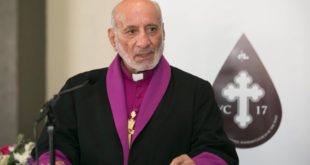In response to a personal and direct invitation from Mr. Ahmet Davutoglu, Foreign Minister of Turkey, His Holiness Mar Dinkha IV, Catholicos-Patriarch, participated in an international conference in Istanbul. Under the theme, ‘The Arab Awakening and Peace in the Middle East: Muslim-Christian Perspectives,’ the conference was held at the Le Meridien Hotel (Istanbul) from the 7th to the 8th of September 2012. The delegation accompanying His Holiness included His Grace Mar Awa Royel, Bishop of California and Secretary of the Holy Synod, and His Grace Mar Paulus Benjamin, Bishop of the Eastern USA Diocese.
The invitation to attend the conference had been extended personally by the Foreign Minister of Turkey in late May of this year, on his visit to Chicago for the NATO summit. The Foreign Minister paid a courtesy call to the Patriarchate of the Assyrian Church of the East and invited His Holiness to attend the international conference, which was sponsored jointly by the ‘Institute of Middle Eastern Studies’ of the Marmara University and the Centre for Islamic Studies (Istanbul).
The international conference was attended by representatives of the Christian denominations that included: the Assyrian Church of the East, the Greek Orthodox Ecumenical Patriarchate, the Greek Orthodox Patriarchate of Jerusalem, the Holy See, the Armenian Orthodox Church (Istanbul Patriarchate), the Syrian Orthodox Church, the Maronite Catholic Church, and the Arabic Lutheran Church. In addition to the many different Muslim denominations from all over the Middle East and North Africa, the conference was well attended by statesmen as well; these included: Turkish Prime Minister Recep Tayyeb Erdugan, Foreign Minister Ahmet Davutoglu, President for Religious Affairs Mehmet Gormuz, Ameen Gmayel, and a host of other diplomats.
The aim of this international conference was to explore and re-evaluate the Christian-Muslim relations in light of the present situation of the Middle East, commonly referred to as the ‘Arab Awakening.’ Prospective for better understanding and tolerance between the two were highlighted in the various talks and round-table discussions of the conference. At the last session of the conference, the following communiqué was officially issued:
“The Arab Awakening has been discussed and debated by political leaders, policy makers, scholars, opinion makers and journalists within and outside the region from different perspectives. This conference brought together for the first time major Muslim and Christian religious leaders from the Arab world, experts and opinion makers to discuss the role of religion in the new Middle East. Discussions and debates recognized the problems and challenges ahead and affirmed that in the new Middle East emerging political cultures should be rooted in a national unity and identity based upon equal citizenship, and the recognition of religious pluralism and cultural diversity. Rather than seeing diversity as a problem, participants spoke of it as an asset and source of richness.
Establishing the rule of law is seen as critical in the protection of the freedoms of individuals and diverse faith communities and groups. However different state systems might be, principles of equality of citizenship, rule of law, and protection of liberties are the fundamental foundations of strong and vibrant civil societies. Authoritarian regimes have too often utilized religions for their own purposes. Thus, instrumentalized religions can become part of the problem. However participants discussed the ways in which religions can also be a powerful resource in the transformation of societies in the new Middle East.
Participants argued that discourses and languages used in the media, popular culture, schools and religious centers are extremely important. Religious leaders and decision makers should lead a process of reforming these areas. This meeting is envisioned to be the beginning of a process of future workshops to discuss and explore the implementation of reforms in emerging political cultures in the Middle East.”
[nggallery id=397] Assyrian Church News Official News Site of the Holy Apostolic Catholic Assyrian Church of the East
Assyrian Church News Official News Site of the Holy Apostolic Catholic Assyrian Church of the East

